Tree Service Salem
Top 10 Tree Care Company in Salem
Get multiple Tree Services quotes for your project today! Compare profiles, reviews, accreditations, portfolio, etc... and choose the best deal.

Mass Bay Tree Service Inc
591 reviews313 Beford Street, 1B, Whitman, 02382, USMass Bay Tree is a local Massachusetts crane-assisted tree removal and crane service provider. They offer a safe and efficient low-impact tree removal at a lower cost than traditional methods, with less time needed when using a crane. Their services include tree removal, crane services, wood chip delivery, and more. They have a team of professional licensed crew members and offer emergency services available. They provide reliable timing and scheduling, crane-assisted removal, and free tree removal quotes.
- Services
- Why Us?
- Accreditations
- Our Team
- Testimonials
- Gallery
Get Quote
Krohn Kutz Tree Service
4.9123 reviewsNot Provided, USKrohn Kutz Tree Service is a Connecticut based team of trained professionals that can take care of any tree removal service you may need. Our equipment is constantly updated and we excel in reaching difficult areas safely, whether it be through tree climbing or our bucket truck services. We work with our customers to reach an informed decision that best meets their needs. Our team has a strong work ethic to get the job done right, quickly and efficiently. Contact Krohn Kutz Tree Service today for a free service estimate!
- Services
- Why Us?
- Accreditations
- Our Team
- Testimonials
- Gallery
Get Quote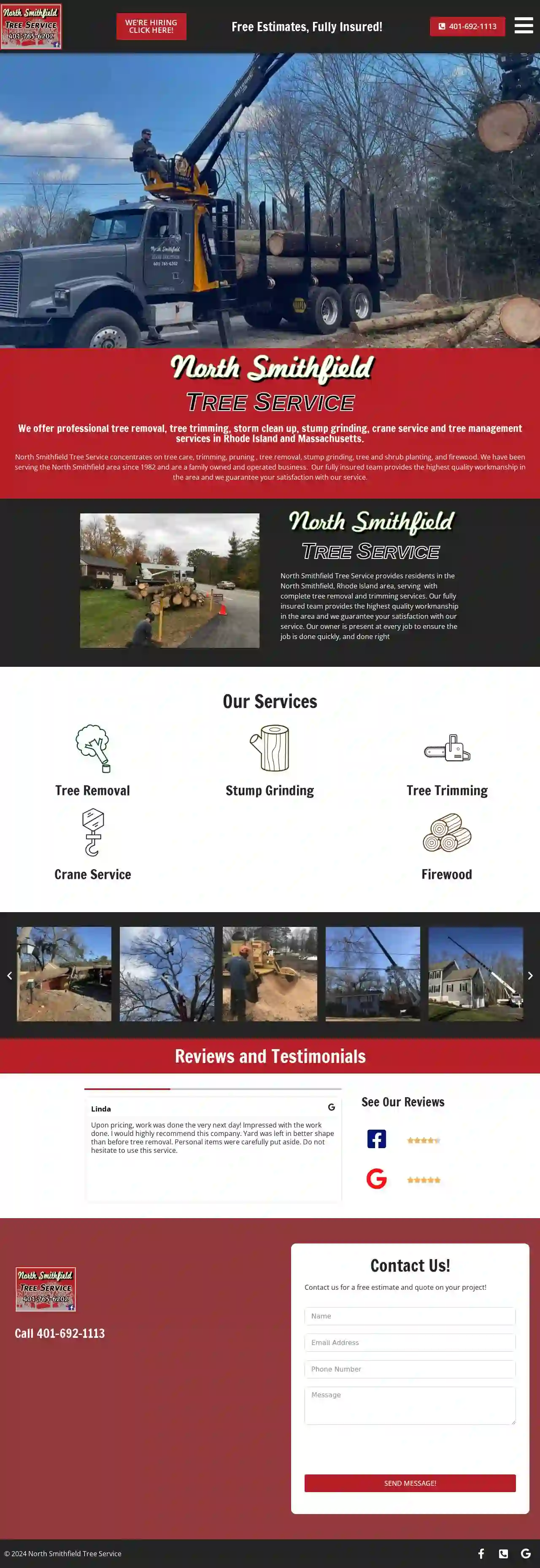
North Smithfield Tree Service
4.8243 reviewsNorth Smithfield, RI, 123 Main St, 02896, USNorth Smithfield Tree Service is a family-owned and operated business that has been serving the North Smithfield area since 1982. They offer professional tree removal, tree trimming, storm clean up, stump grinding, crane service, and tree management services in Rhode Island and Massachusetts. Their fully insured team provides the highest quality workmanship in the area and guarantees satisfaction with their service.
- Services
- Why Us?
- Accreditations
- Our Team
- Testimonials
- Gallery
Get Quote
Boston Tree Preservation
4.610 reviewsWoburn, MA, 2 Draper St, 01801, USBoston Tree Preservation was founded in 1977 and is committed to providing an organic approach to caring for the entire landscape; trees, shrubs, lawn and soil in order to preserve and protect the urban forest for present and future generations.
- Services
- Why Us?
- Accreditations
- Our Team
- Testimonials
- Gallery
Get Quote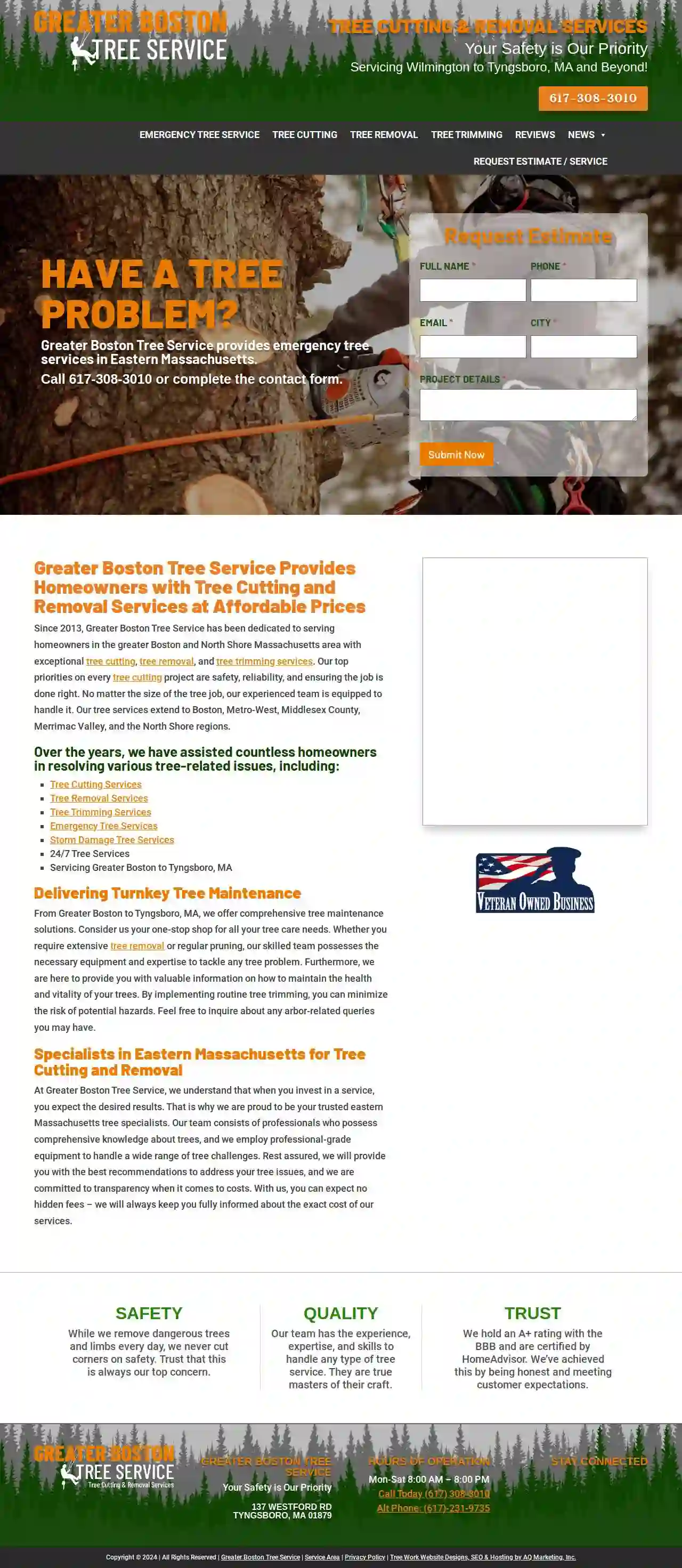
Greater Boston Tree Service
4.930 reviews137 Westford Rd, Tyngsboro, MA, 01879, USGreater Boston Tree Service provides emergency tree services in Eastern Massachusetts. Since 2013, they have been dedicated to serving homeowners in the greater Boston and North Shore Massachusetts area with exceptional tree cutting, tree removal, and tree trimming services. Their top priorities on every tree cutting project are safety, reliability, and ensuring the job is done right. They offer comprehensive tree maintenance solutions and are your trusted eastern Massachusetts tree specialists.
- Services
- Why Us?
- Accreditations
- Our Team
- Testimonials
- Gallery
Get Quote
South Coast Tree Service Inc.
4.940 reviewsLakeville, MA, 02747, USAt South Coast Tree Service, we’re committed to helping you make the most of your trees, whether it’s trimming them, pruning them, or removing them altogether. Our team has over a decade of experience in the industry. We’re fully insured and ready to help you keep your trees thriving.
- Services
- Why Us?
- Gallery
Get Quote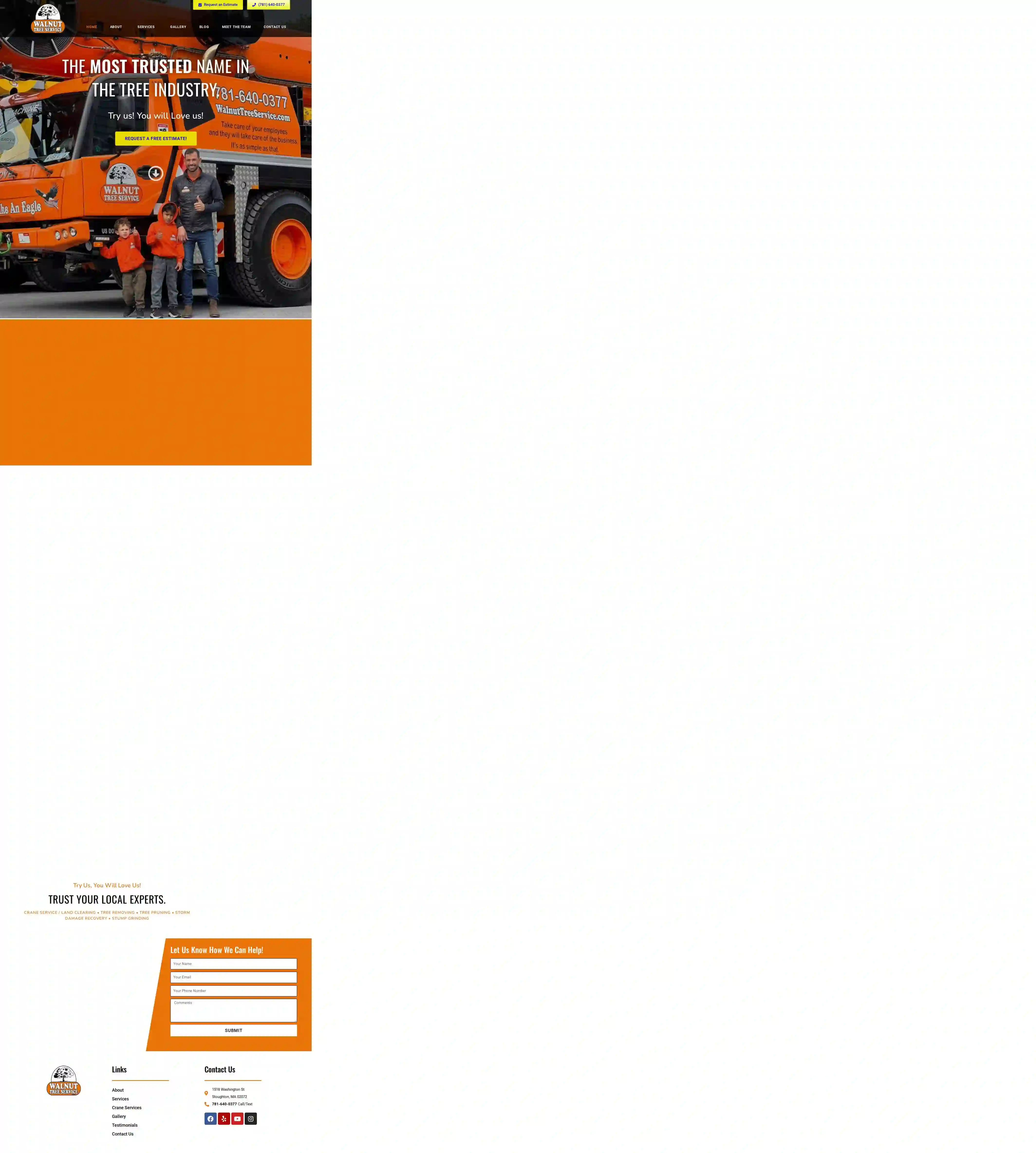
Walnut Tree Services
5766 reviewsStoughton, MA, 1518 Washington St, 02072, USThe Most Trusted Name in the Tree Industry. Try us! You will Love us! Massachusetts' Premier Tree Service Company. A fully-insured, family-owned and operated business that has been servicing the Greater South Shore Area and Boston area for over 12 years now. Walnut Tree Service provides year-round service to residential and commercial customers. We specialize in tree removal and trimming as well as the land clearing and stumps grinding. To provide our customers, with the best possible service, we remain abreast of the latest changes and innovations affecting the professional arborist.
- Services
- Why Us?
- Accreditations
- Our Team
- Testimonials
- Gallery
Get Quote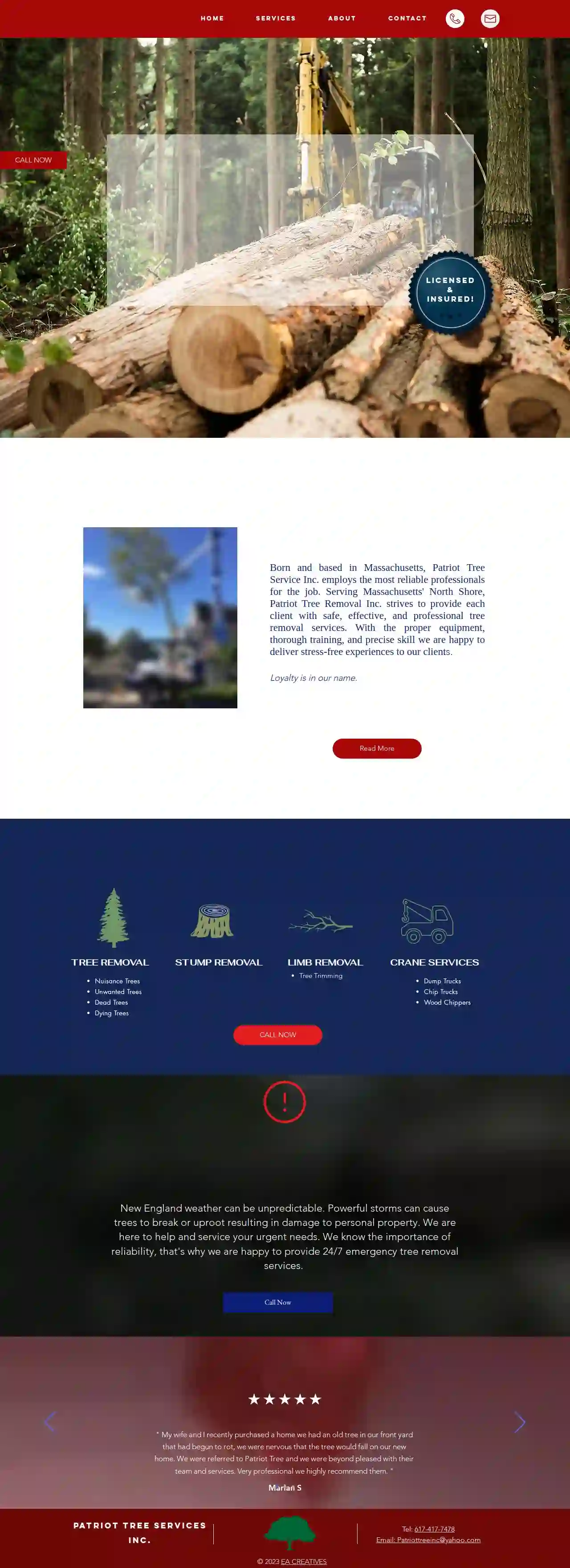
Patriot Tree Service Inc
4.619 reviewsMassachusetts, USA, North Shore, MA, USPatriot Tree Service Inc. is a Massachusetts-based company that employs reliable professionals to provide safe, effective, and professional tree removal services. They serve the North Shore area and strive to deliver stress-free experiences to their clients. Their services include tree removal, stump removal, limb removal, crane services, and emergency services.
- Services
- Why Us?
- Testimonials
- Gallery
Get Quote
Arborway Tree Care
4.519 reviewsHyde Park, MA, 10 A Street, 02136, USArborway Tree Care Inc. is a full-service, locally owned and operated tree care company that has nurtured and cared for trees for forty years. Our certified arborist and trained professionals always have the customer’s best interest in mind. Arborway Tree Care recognizes the value of your property and feels it is our responsibility to provide you with honest, informed advice backed by the most current industry practices. We pride ourselves on preservation and quality arboriculture for the long term health of your trees. We are fully insured and professionally trained and stand by our work.
- Services
- Why Us?
- Accreditations
- Our Team
- Testimonials
- Gallery
Get Quote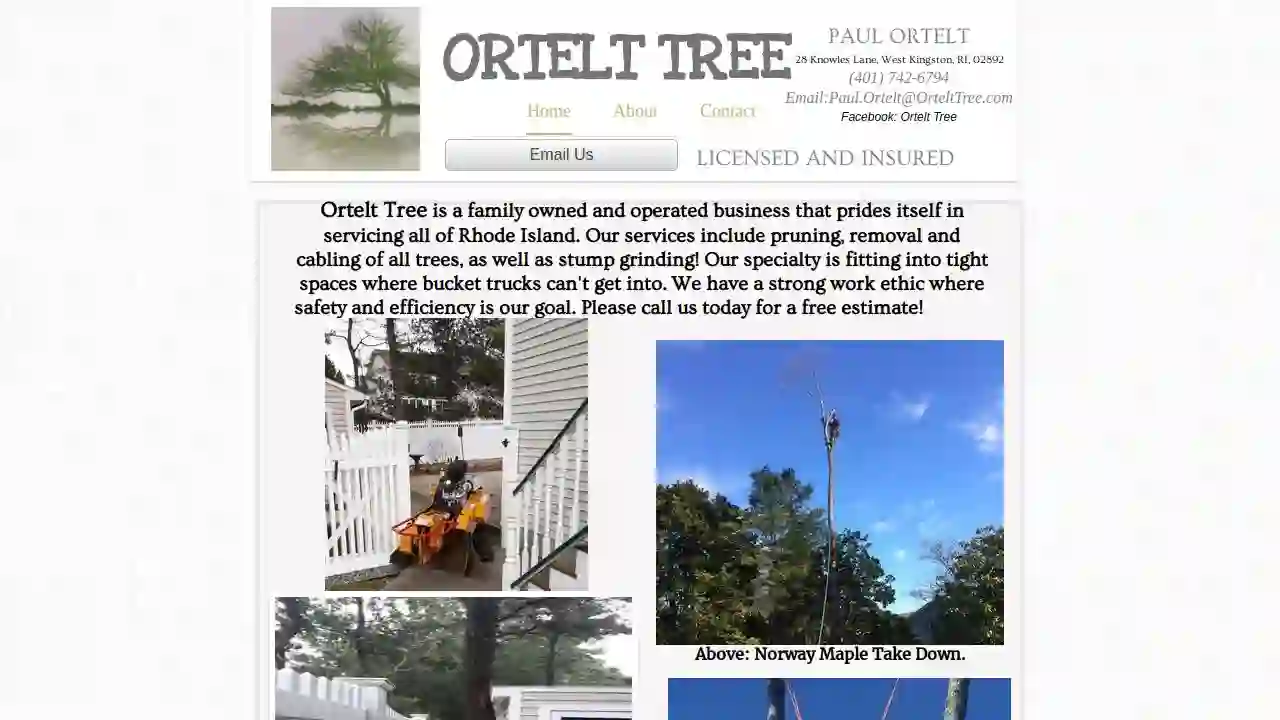
Ortelt Tree
55 reviews28 Knowles Lane, West Kingston, 02892, USOrtelt Tree is a family owned and operated business that prides itself in servicing all of Rhode Island. Our services include pruning, removal and cabling of all trees, as well as stump grinding! Our specialty is fitting into tight spaces where bucket trucks can't get into. We have a strong work ethic where safety and efficiency is our goal. Please call us today for a free estimate!
- Services
- Why Us?
- Our Team
- Gallery
Get Quote
Over 16,467+ Arborists onboarded
Our tree service contractors operate in Salem and beyond!
TreeServiceMatch has curated and vetted Top Tree Surgeons in and around Salem. Find a top & reliable contractor today.
Frequently Asked Questions About Tree Services
- Experience and qualifications: 'How long have you been in business? Are your arborists certified? What experience do you have with similar projects?'
- Licensing and insurance: 'Are you licensed and insured? Can you provide proof of insurance?'
- Safety practices: 'What safety measures do you take to protect your workers and my property during the project?'
- Cleanup and disposal: 'What will you do with the tree debris after the job? Will you remove the stump and clean up the work area?'
- References: 'Can you provide references from previous clients?'
- Written estimates: 'Can you provide a detailed written estimate outlining the scope of work, costs, and timeframe?'
- Extensive dieback: Large portions of the tree's crown are dead, with no signs of new growth.
- Severe bark damage: Large sections of bark are missing or severely damaged, exposing the inner wood.
- Root decay: Mushrooms or conks growing at the base of the tree, indicating fungal decay in the root system.
- Leaning precariously: The tree is leaning significantly and showing signs of instability.
- No leaves or buds: During the growing season, the tree is completely bare of leaves and shows no signs of new buds forming.
- Woodpecker holes: While a few woodpecker holes are not necessarily a cause for concern, numerous holes can indicate insect infestation or decay within the tree.
- Shallow Soil: In areas with thin or compacted soil, roots may not be able to penetrate deeply and instead grow near the surface.
- Soil Compaction: Heavy foot traffic, construction activities, or vehicles can compact the soil, making it difficult for roots to grow downward.
- Low Oxygen Levels: Roots need oxygen to survive, and in poorly drained or compacted soil, they may grow near the surface to access more oxygen.
- Seeking Nutrients: Roots may grow towards areas with higher nutrient concentrations, which can be near the surface in some cases.
- Tree Species: Some tree species are naturally prone to surface roots, such as maples, willows, and poplars.
- Age: As trees age, their root systems expand, and some roots may naturally grow closer to the surface.
- 10 feet away from foundations for small trees (mature height under 30 feet).
- 20 feet away from foundations for medium-sized trees (mature height 30-70 feet).
- 30 feet or more away from foundations for large trees (mature height over 70 feet).
What questions should I ask a tree service company?
How do I know if a tree is dying?
Why do tree roots grow above ground?
How close to a house can you plant a tree?
What questions should I ask a tree service company?
- Experience and qualifications: 'How long have you been in business? Are your arborists certified? What experience do you have with similar projects?'
- Licensing and insurance: 'Are you licensed and insured? Can you provide proof of insurance?'
- Safety practices: 'What safety measures do you take to protect your workers and my property during the project?'
- Cleanup and disposal: 'What will you do with the tree debris after the job? Will you remove the stump and clean up the work area?'
- References: 'Can you provide references from previous clients?'
- Written estimates: 'Can you provide a detailed written estimate outlining the scope of work, costs, and timeframe?'
How do I know if a tree is dying?
- Extensive dieback: Large portions of the tree's crown are dead, with no signs of new growth.
- Severe bark damage: Large sections of bark are missing or severely damaged, exposing the inner wood.
- Root decay: Mushrooms or conks growing at the base of the tree, indicating fungal decay in the root system.
- Leaning precariously: The tree is leaning significantly and showing signs of instability.
- No leaves or buds: During the growing season, the tree is completely bare of leaves and shows no signs of new buds forming.
- Woodpecker holes: While a few woodpecker holes are not necessarily a cause for concern, numerous holes can indicate insect infestation or decay within the tree.
Why do tree roots grow above ground?
- Shallow Soil: In areas with thin or compacted soil, roots may not be able to penetrate deeply and instead grow near the surface.
- Soil Compaction: Heavy foot traffic, construction activities, or vehicles can compact the soil, making it difficult for roots to grow downward.
- Low Oxygen Levels: Roots need oxygen to survive, and in poorly drained or compacted soil, they may grow near the surface to access more oxygen.
- Seeking Nutrients: Roots may grow towards areas with higher nutrient concentrations, which can be near the surface in some cases.
- Tree Species: Some tree species are naturally prone to surface roots, such as maples, willows, and poplars.
- Age: As trees age, their root systems expand, and some roots may naturally grow closer to the surface.
How close to a house can you plant a tree?
- 10 feet away from foundations for small trees (mature height under 30 feet).
- 20 feet away from foundations for medium-sized trees (mature height 30-70 feet).
- 30 feet or more away from foundations for large trees (mature height over 70 feet).